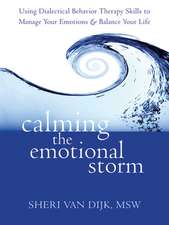Foundations of Exercise Psychology
Autor Bonnie G Berger, Dr Robert S Weinberg, Robert C Eklund PhDen Limba Engleză Paperback – sep 2015
Preț: 566.88 lei
Preț vechi: 691.32 lei
-18% Nou
Puncte Express: 850
Preț estimativ în valută:
108.49€ • 112.40$ • 90.54£
108.49€ • 112.40$ • 90.54£
Carte disponibilă
Livrare economică 28 februarie-14 martie
Livrare express 13-19 februarie pentru 60.33 lei
Preluare comenzi: 021 569.72.76
Specificații
ISBN-13: 9781935412588
ISBN-10: 1935412582
Pagini: 552
Ilustrații: b/w photos
Dimensiuni: 215 x 280 x 29 mm
Greutate: 1.28 kg
Editura: FITNESS INFORMATION TECHNOLOGY
Colecția Fitness Information Technology (US)
ISBN-10: 1935412582
Pagini: 552
Ilustrații: b/w photos
Dimensiuni: 215 x 280 x 29 mm
Greutate: 1.28 kg
Editura: FITNESS INFORMATION TECHNOLOGY
Colecția Fitness Information Technology (US)
Recenzii
"Psychology can work in at least two ways, as this book clearly shows. First, we can gain psychological benefits from physical activity. This is encapsulated in the early chapters on quality of life, stress management, self-perceptions, and mood. Second, we need to understand how to assist people to become more active. This is where chapters on theories and models, motivation, determinants, and strategies come in. [. . .] In addition, psychology is also about behaviour change across different groups and settings. The authors deal with this by writing on young people, older adults, and gender issues. One size does not fit all." -- From the foreword by Stuart J H Biddle, Professor of Active Living & Public Health, Victoria University
Cuprins
Chapter 1: The Exciting Field of Exercise Psychology. Chapter 2: Exercise Psychology: A Historical Perspective. Chapter 3: Exercise and the Quality of Life. Chapter 4: Exercise and Self-Perception Constructs. Chapter 5: Mood and Exercise: Basic Considerations. Chapter 6: Exercise, Mood Alteration, and Self-Awareness: Multiple Relationships. Chapter 7: Stress: A Double-Edged Sword of Distress and Eustress. Chapter 8: Exercise as a Stress Management Technique: Psychological and Physiological Effects. Chapter 9: Exercise and Cognitive Function. Chapter 10: Personality and Exercise. Chapter 11: Psychology of Injury. Chapter 12: Models of Exercise Behavior. Chapter 13: Motivational Determinants of Exercise Behavior. Chapter 14: Motivational Strategies to Enhance Exercise Adherence. Chapter 15: In Search of Personal Meaning in Physical Activity. Chapter 16: Optimal Experience in Exercise. Chapter 17: Exercise Concerns: Eating Disorders, Substance Abuse, and Exercise Dependence. Chapter 18: Gender Issues in Exercise. Chapter 19: Youth Physical Activity Chapter 20: Exercise Psychology Considerations for Older Individuals. Chapter 21: Exercise Enjoyment and Mode Considerations: Taxonomy for Optimizing Subjective Well-Being. Chapter 22: Practice Guidelines for Maximal Psychological Benefits: Exercise Frequency, Intensity, and Duration.








